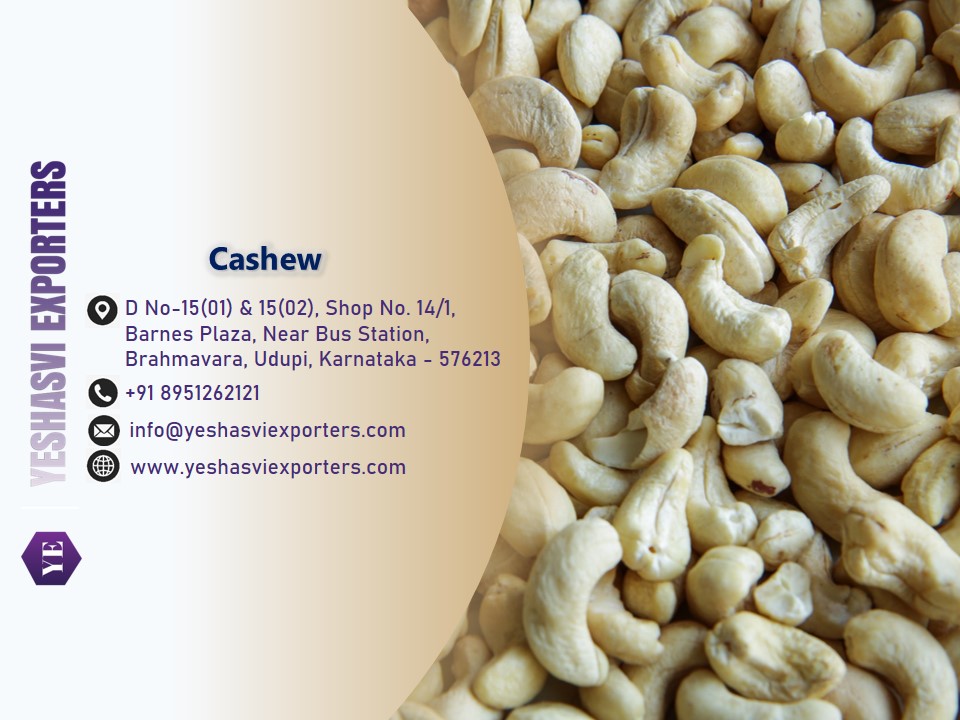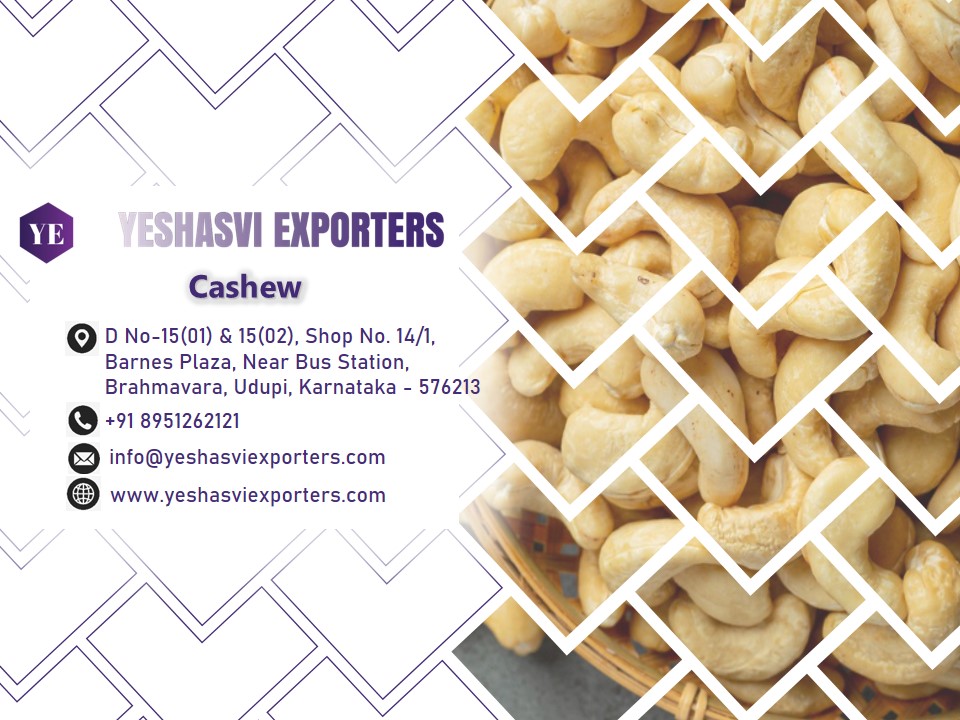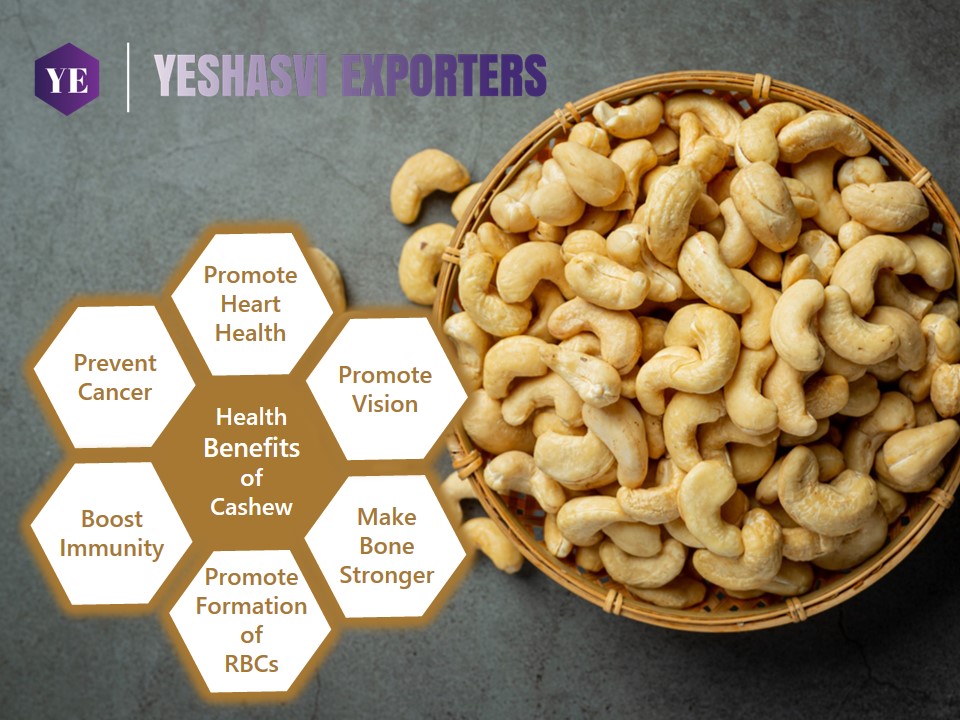Cashew:
What is cashew?
- Popular cashew nuts are native to Brazil but are now grown in many tropical areas all over the world. Cashews are distinctive because they are linked to the bottom of the fleshy fruit known as a "cashew apple." The kidney-shaped cashew nut has a hard shell that must be carefully removed before eating since it contains a poisonous oil.
- Cashews are used in a variety of culinary preparations, including as a snack, in baked products, and in many savory meals. They are prized for their rich, buttery flavor. They are frequently used as a dairy-free substitute for cheese or as a creamy base for sauces and dressings in vegan and plant-based dishes.
- Cashews can be used in cooking, but they are also nutrient-rich. They are a good source of fiber, vitamins, and minerals like copper, magnesium, and phosphorus, as well as protein, fiber, and beneficial fats. Cashews have been linked to a number of positive health effects, including greater bone health, improved brain function, and heart health.
How many cashews in 1 oz?
Due to the variety of shapes and sizes of cashews, there may be more or fewer cashews in 1 ounce depending on their size and weight. But in 1 ounce (28.35 grams) of cashews, there are typically 18 to 20 cashews. Please be aware that this is merely a rough estimate, and there may be a small variation in the actual weight of cashews in an ounce.

What cashew nuts good for?
There are many uses for cashew nuts, which are a versatile and healthy food. Cashew nuts can be used for the following purposes:
- Snacking: Cashews are frequently consumed as a tasty and filling snack on their own. They have a thick, creamy texture and a mildly sweet flavor, which make them a popular option for snacking.
- Uses in cooking: Cashews can be used in a wide range of dishes. They can be salted, roasted, or spiced to provide a flavorful and crispy topping for salads, stir-fries, or desserts. Additionally, cashews can be used in sauce, dressing, and dip recipes. Examples include cashew-based vegan cheese and creamy cashew sauces.
- Baking: Cashews can be added to recipes to give them a creamy and nutty flavor. They can be used as a topping for cakes, pastries, and other baked items or mashed into cashew meals. Cashew butter can be used as a spread or an ingredient in baking recipes. It is created by mixing cashews into a smooth paste.
- For people who are lactose intolerant or on a vegan or dairy-free diet, cashew milk is a popular plant-based milk substitute that may be made by soaking cashews, blending them with water, and straining the mixture. In dishes, smoothies, and drinks, cashew milk can be substituted for dairy milk.
How many cashew should I eat a day?
Depending on a number of variables, such as your age, sex, degree of activity, general health, and dietary objectives, the recommended daily intake of cashews may change. Because cashews are high in beneficial fats and have a lot of calories, it's vital to include nuts in your diet in moderation as part of a balanced diet.
A normal serving size for nuts, including cashews, is about 1 ounce, or roughly 18 to 20 cashews, and it contains between 150 and 170 calories. Most people can start with this serving size as a snack or an ingredient in meals.

Are Cashews good for pregnant woman?
If included in a balanced diet, cashews can be a nourishing food option for expectant mothers, barring any dietary limitations or allergies. The following are some possible advantages of cashews for expectant mothers:
- Rich in nutrition: Cashews are a wonderful source of several nutrients, including good fats, protein, dietary fiber, vitamins (including vitamin E, B vitamins, and folate), and minerals (such as magnesium, phosphorus, and zinc). These nutrients can be helpful during pregnancy. During pregnancy, these nutrients may assist both the mother's general health and the growth of the fetus.
- Folate: Also known as folic acid, this B vitamin is crucial during the early stages of pregnancy while the fetal neural tube is developing. The folate in cashews is a good source of folate, and getting enough folate the chance of some birth malformations, such as neural tube defects, may be lowered throughout pregnancy.
- Due to their high-calorie content and good fat content, cashews can give pregnant women energy and help them feel fuller for longer. This may be advantageous during pregnancy, when there may be changes in appetite and higher energy requirements.
- Healthy fats: Cashews are an excellent source of monounsaturated fats, which are thought to be heart-healthy fats. Consuming healthy fats in moderation while pregnant can improve general health and possibly aid fetal growth.
- Dietary flexibility: Cashews can be used in a wide range of dishes, including spreads, toppings, snacks, and baked goods. They can enhance the nutrition, flavor, and texture of meals that might support expecting mothers in maintaining a varied and balanced diet.

How cashews importing from India is best for your business!
A company that deals with the import and sale of nuts may benefit in a number of ways from importing cashews from India. Here are a few of the main advantages:
High-grade cashews: India is a major producer and exporter of cashews, which are renowned for their superior quality and flavour. A company may stand out in the market and develop a devoted client base by using the reputation that Indian cashews have for their rich, buttery flavour.
Cost-efficient: India is renowned for producing premium cashews at reasonable costs. A company may retain its profit margins and keep its product pricing competitive by importing cashews from India.
Year-round availability: Cashews are farmed all year round in India, thus a company that imports cashews from India may do so can have year-round access to a steady supply of cashews. Even during the off-season, when cashews are unavailable in other areas of the world, this can assist in supplying the need for cashews.
Supply chain diversification: By importing cashews from India, a company can lessen the risk of supply chain disruptions brought on by unforeseen events in other nations where they typically source cashews, such as natural disasters, political unrest, or other unforeseen occurrences.
Flexibility: Cashews may be utilized in a variety of foods, such as curries, snacks, and desserts. A company that imports cashews from India may take advantage of this adaptability and provide a variety of goods to its clients.